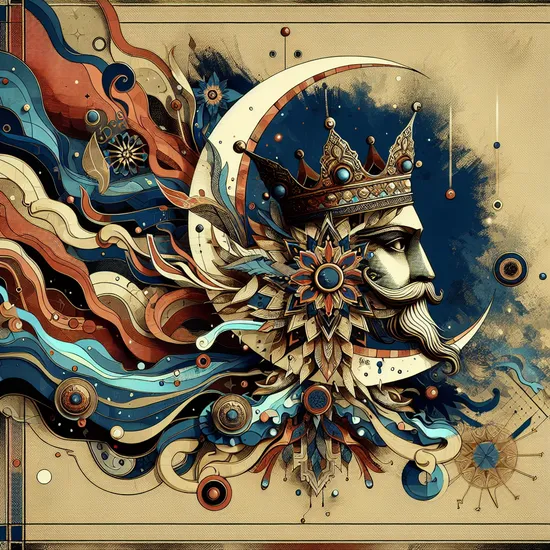Sultan - Uncovering the Meaning, Origin, Popularity, and More
Meaning of the Name Sultan
The name Sultan conveys the majestic meaning of a ruler or king. It denotes an individual of power and authority, often associated with leadership and strength. The name has its roots in royal and noble contexts, symbolizing a command over others and governance abilities. It implies a strong presence, often evoking a sense of respect and admiration in various cultures.
Find more names related to the name Sultan.
Noble,
Leader,
Guardian,
Arabic,
Turkish,
Origin of the Name Sultan
The name Sultan has deep roots in Arabic culture, where it is traditionally used to denote an emperor or a supreme leader. It embodies a sense of nobility and authority, widely recognized in regions historically influenced by Islamic rule. This name is woven into the fabric of Middle Eastern history and carries with it the inspiration of leadership and governance across centuries.
Gender Association of the Name Sultan
The name Sultan is primarily associated with the male gender, commonly used for males across Middle Eastern and Asian cultures. However, it can also be seen as gender-neutral in diverse parts of the world, celebrated for its universal appeal. Notable figures such as transnational leaders, encompassing both male and female personalities, have borne this illustrious name, enhancing its cross-gender appeal.
Popularity of the Name Sultan
The name Sultan ranks highly in regions with rich Arabic cultural influence, such as Saudi Arabia and Turkey. Its usage in non-Arabic cultures is growing due to increased global access to diverse cultural heritages. Across recent years, the name has witnessed a steady ascent in popularity charts, particularly noted for its classy and commanding aura, which continues to inspire new generations.
Global Usage of the Name Sultan
Globally, the name Sultan resonates across different regions, stretching from Middle Eastern countries like Saudi Arabia, United Arab Emirates, to Turkish speaking nations. With slight variations in pronunciation and spelling, it has become a symbol of regal elegance in Anglophone countries and remains a favored choice due to its profound historical resonance. Its exotic appeal makes Sultan appropriate for modern multicultural contexts.
| Global Distribution and Gender Ratio of the Name Sultan |
| Country |
Usage % |
Female % |
Male % |
| TR |
54.11% |
91.18% |
8.82% |
| SA |
34.53% |
2.34% |
97.66% |
| KW |
2.19% |
1.89% |
98.11% |
| AE |
1.73% |
2.4% |
97.6% |
| US |
1.13% |
4.47% |
95.53% |
Analysis of name gender and country popularity is derived from
Gender API data.
Characteristic Features of People Named Sultan
- Leadership Qualities : Individuals named Sultan often exhibit strong leadership and decision-making abilities, resembling the historical significance of the name as a ruler.
- Confident Presence : They tend to have a commanding and charismatic presence, naturally attracting respect from peers and colleagues.
- Highly Ambitious : These individuals are driven by goals and ambitions, with a persistent nature to achieve greatness in their endeavors.
- Cultural Awareness : Having strong ties to cultural history, people named Sultan often show a deep appreciation and understanding of their heritage.
- Noble Demeanor : With a name synonymous with royal lineage, they inherently carry a noble touch in their behavior and interactions.
Common Career Paths for People Named Sultan
- Leadership and Management : Given the commanding nature of the name, many find success in executive roles where they can lead teams and manage operations effectively.
- Diplomatic and Government Roles : Individuals with this name often engage in careers associated with diplomacy or governmental positions, channeling their inherent leadership abilities.
- Business and Entrepreneurship : Sultan-named people frequently venture into business, seeking innovative ideas to establish and grow their enterprises.
- Academia and Research : The pursuit of knowledge and structured thought processes attract many towards professions in education and research.
- Creative Arts and Communication : With developed cultural insights, some engage in storytelling or artistic expressions, channeling their rich cultural association into art and media.
Unique and Interesting Characteristics of the Name Sultan
- Historical Significance : The name has been associated with rulers and emperors throughout Islamic history, adding to its regal and authoritative nature.
- Pop Culture : 'Sultan', as a name, frequently appears in films and series, symbolizing powerful figures, and showcasing strong personalities.
- Representation in Literature : In literature, namesakes often reflect valiant and commanding characters, upholding its royal lineage.
- Notable Public Figures : Several globally recognized personalities in politics and entertainment bear this name, enhancing its universal charm.
- Artistic Influence : The name draws upon rich artistic heritage, with many creative works inspired by the iconic title of Sultan in various cultures.
Famous People Named Sultan
- Sultan of Brunei: Brunei's current monarch known for his wealth and political influence.
- Sultan Kösen: Known as the tallest man in the world as recognized by Guinness World Records.
Similar Names
-
Amir: Derived from Arabic, Amir refers to a prince or commander, akin to Sultan's regal connotations.
-
Malik: In Arabic, Malik signifies a king or chieftain, sharing the leadership aura present in Sultan.
-
Shah: A Persian term for emperor, Shah often carries the majestic and powerful nuances akin to Sultan.
-
Khalifa: An Arabic name meaning successor or ruler, frequently associated with Islamic leadership.
-
Imran: A popular Arabic name implying noble qualities, like those associated with Sultan.
-
Zayd: Connotations of abundance and growth, reflecting prosperity often linked to regal names like Sultan.
-
Yusuf: An Arabic name with meanings of power and authority, sharing similarities with Sultan.
-
Faisal: Decisive or judge in Arabic, mirroring leadership based meanings found in Sultan.
-
Habib: With roots in Arabic, it means beloved, evoking esteem, much like the command Sultan suggests.
-
Tariq: An Arabic name, meaning morning star, frequently associated with valor and strength, akin to Sultan.
